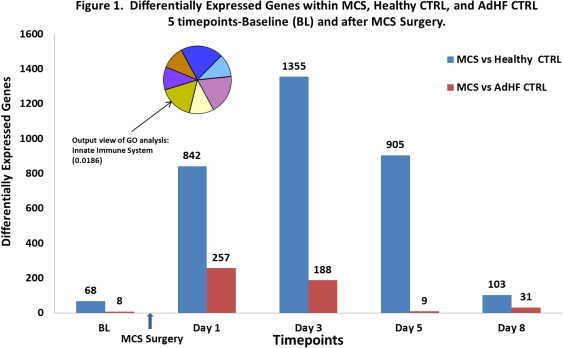Serial Peripheral Blood Mononuclear Cell Expression Profiling Reveals Inflammatory Genomic Storm Following Mechanical Circulatory Support Surgery.
1University of California, Los Angeles, Los Angeles, CA
2Shanxi Medical University First Hospital, Taiyuan, Shanxi, China.
Meeting: 2016 American Transplant Congress
Abstract number: 241
Keywords: Gene expression, Heart failure, Inflammation, Ventricular assist devices
Session Information
Session Name: Concurrent Session: Molecular and Bio-Markers in Hearts and VADs - A New Hope
Session Type: Concurrent Session
Date: Monday, June 13, 2016
Session Time: 2:30pm-4:00pm
 Presentation Time: 2:30pm-2:42pm
Presentation Time: 2:30pm-2:42pm
Location: Room 102
Introduction: The main cause of death in patients with Advanced Heart Failure (AdHF) is the Multi-Organ Dysfunction (MOD) Syndrome. Immune system aberrancy after Mechanical Circulatory Support (MCS) implantation may cause MOD. We hypothesized that, compared to stable AdHF-patients, patients undergoing MCS exhibit a time-dependent exaggerated innate inflammatory gene expression profile (GEP).
Methods: PBMC samples from AdHF patients undergoing MCS surgery (53±25 y.o.) (MCS, n=28), AdHF patients (AdHF CTRL, n=3) and age matched Healthy Controls (Healthy CTRL, n=4), were collected at 1 day before surgery, and days 1, 3, 5 and 8 postoperatively (August 2012 – 2015). Purified mRNA was subjected to whole-genome NGS analysis. Data was analyzed using Genespring GX12.6 (Agilent). Differentially expressed genes were identified by Two-way ANOVA and Benjamini-Hochberg correction (corrected p-value .05). Only those with fold change of at least 1.5 were included in the analysis. Biological significance was assessed using gene ontology (GO).
Results: In MCS patients, compared to AdHF CTRLs and Healthy CTRLs, the number of differentially expressed genes time-dependently increased on days 1 and 3 after surgery and decreased on days 5 and 8  . The overrepresented GO categories heavily involved innate immunity GO-categories.
. The overrepresented GO categories heavily involved innate immunity GO-categories.
Conclusion: A large number of genes, representing a genomic storm, are differentially expressed following MCS-surgery in a time-dependent manner, potentially contributing to the pathophysiology of MOD and requiring further study.
CITATION INFORMATION: Godoy G, Bondar G, Esmaeili A, Arellano E, Chang E, Bakir M, Chittoor J, Togashi R, Fazli N, Starling C, Oh E, Toluie S, Yang Z, Tran D, Cadeiras M, Wisniewski N, Kwon M, Schaenman J, Korin Y, Rosetti M, Reed E, Deng M. Serial Peripheral Blood Mononuclear Cell Expression Profiling Reveals Inflammatory Genomic Storm Following Mechanical Circulatory Support Surgery. Am J Transplant. 2016;16 (suppl 3).
To cite this abstract in AMA style:
Godoy G, Bondar G, Esmaeili A, Arellano E, Chang E, Bakir M, Chittoor J, Togashi R, Fazli N, Starling C, Oh E, Toluie S, Yang Z, Tran D, Cadeiras M, Wisniewski N, Kwon M, Schaenman J, Korin Y, Rosetti M, Reed E, Deng M. Serial Peripheral Blood Mononuclear Cell Expression Profiling Reveals Inflammatory Genomic Storm Following Mechanical Circulatory Support Surgery. [abstract]. Am J Transplant. 2016; 16 (suppl 3). https://atcmeetingabstracts.com/abstract/serial-peripheral-blood-mononuclear-cell-expression-profiling-reveals-inflammatory-genomic-storm-following-mechanical-circulatory-support-surgery/. Accessed February 14, 2026.« Back to 2016 American Transplant Congress
